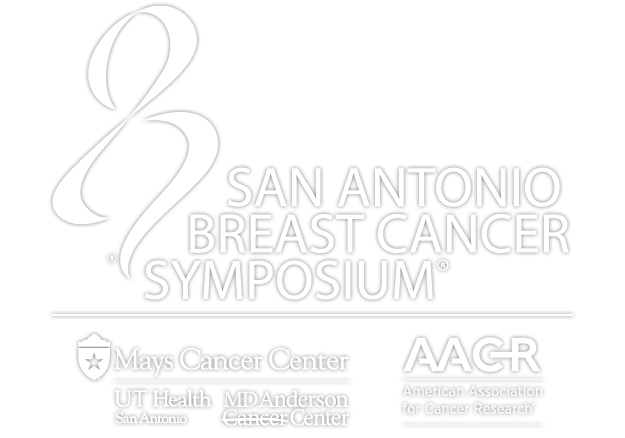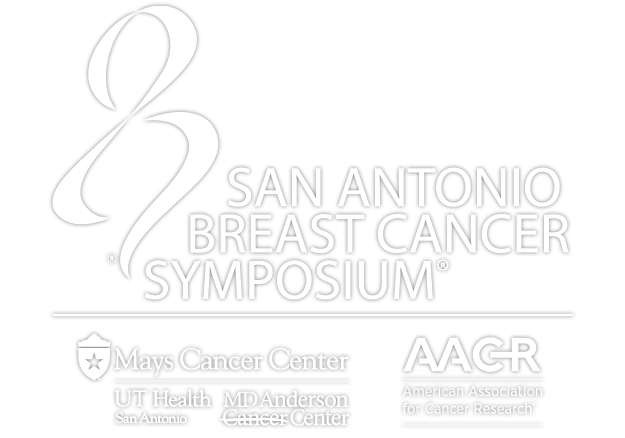The past year has brought practice-changing insights and advances across the continuum of breast cancer research—from mechanistic underpinnings to real-world clinical practice. SABCS® Co-Directors Virginia Kaklamani, MD, and Carlos Arteaga, MD, moderated the Year in Review session, in which a panel of experts explored significant advances in breast cancer over the past year.
Basic research

Heide L. Ford, PhD, Professor and Chair at the University of Colorado School of Medicine, led the task of reviewing key insights, enabled via basic science research, on the biology of breast cancer subtypes, the tumor immune landscape, and the role of epigenetic and translational plasticity in driving tumor metastasis.
Dr. Ford highlighted a study on the impact of estrogen on genomic structure and translocation-bridge amplification in ER+ breast cancers. A molecular study that identified four distinct HR+/HER2- subtypes, potentially amenable to different treatment approaches, came next. The last study focused on the molecular reason(s) for the lack of effectiveness of immune checkpoint inhibitor (ICI) therapy of triple-negative breast cancer (TNBC) (only 15% of patients respond). In a mouse model, natural killer (NK) cell activation was found to sensitize breast cancer cells to ICI therapy and improve survival.
Breast cancer has historically been considered an immune “cold” tumor that is less amenable to immunotherapy. However, the tumor immune microenvironment (TME) varies across breast cancer subtypes and studies are also evaluating ways to ramp up the antitumor immune response.
Dr. Ford reviewed key findings on the role of macrophages, and their modulation in the TME, as ways of modulating the immune response. She summarized a study on the macrophage–T-cell interplay and its impact on disease progression.
The final study focused on microglia-mediated anti-tumor immune responses within brain metastases of breast cancer.
“I thought this was an important study, as it also contrasts with pro-tumorigenic functions normally described for tumor-associated macrophages and may open new avenues for specifically activating the anti-tumor function of microglia for brain metastases,” Dr. Ford said.
Translational research

Jennifer K. Richer, PhD, Professor at the University of Colorado Anschutz Medical Campus, started her review of advances in breast cancer translational science in 2023, with a closer look at artificial intelligence (AI)-assisted screening to facilitate early breast cancer detection.
An AI tool—“Mia”—improved the rate of early detection of invasive and small tumors by 13%. The MASAI study from Sweden showed similar rates of cancer detection using AI-supported screening and standard double reading by humans.
Dr. Richer concluded, “I actually predict that with continued training, AI-assisted [breast cancer] screening will become widely used in the next five years.”
Dr. Richer summarized findings from recent studies on post-partum breast cancer (PP-BC). PP-BC is associated with an increased risk for metastasis and death, compared with breast cancer subtypes in premenopausal women during or outside pregnancy. Dr. Richer noted the importance of finding new ways to detect PP-BC, as the higher breast density in younger women lowers mammographic sensitivity. Identification of circulating tumor (ct)DNA in breast milk was shown to be a feasible approach for PP-BC detection, per a proof-of-concept study.
Dr. Richer then focused on studies on treatment response prediction. Molecular profiling of aromatase inhibitor-sensitive and aromatase inhibitor-resistant ER+/HER2- postmenopausal breast cancers showed that poorly responsive tumors had low ESR1/ER expression, among other features. ESR1 encodes an estrogen receptor, the expression of which determines endocrine sensitivity. Poorly responding tumors with high ESR1 expression had G2/M and mitotic spindle hallmarks, suggesting that these tumors may respond to CDK4/6 inhibitor (CDK4/6i)-based treatment.
Dr. Richer highlighted ctDNA monitoring as an early response predictor, based on data from the I-SPY2 study. She concluded that ctDNA alone is not adequate at this time to monitor early response and would need to be used in combination with other assessments.
Dr. Richer then reviewed the phase II DAISY trial, which evaluated trastuzumab deruxtecan (T-DXd) in breast cancers with varying HER2 levels. While antitumor activity was highest in tumors expressing high HER2 levels, there was modest activity in tumors with medium or low-to-no HER2. She said, “This may expand the population deriving benefit from this ADC, and [the study] highlights the importance of optimized HER2 assays.”
Early breast cancer

Developments in early breast cancer were outlined by Ann Partridge, MD, MPH, Vice Chair of Medical Oncology at Dana-Farber Cancer Institute. Her talk centered on three key themes—effectiveness of treatment tailoring by escalation/de-escalation; practice-informing/-altering insights from unconventional study designs and real-world evidence (RWE); and the increasing focus on care of the whole patient.
Anastrozole can lower estradiol-associated breast cancer risk in postmenopausal women, per the IBIS-II prevention trial. Dr. Partridge described results presented at the 2023 SABCS® by Jack Cuzick, PhD, recipient of the 2023 William L. McGuire Memorial Lecture Award. Follow-up case-control IBIS-II data showed that the protective effect of aromatase inhibitor therapy was higher in people with higher baseline estradiol levels.
Dr. Partridge said, “This is exciting new data that suggests that we could potentially tailor prevention based on this biomarker. Could we dose-adjust to the biomarker to get [the] minimally [lowest] effective dose and minimize toxicity? Could we do this for patients with HR+ invasive disease, ultimately? Wouldn’t that be great?”
Dr. Partridge then discussed advances in local therapy, detailing results of two studies presented at SABCS®—the SENOMAC and NSABP B-51 trials— and RWE from the observational ICARO study. She described findings as “practice-confirming” or “practice-changing to some who are not quite there yet.”
ICI therapy, added to neoadjuvant chemotherapy and then as adjuvant monotherapy, has become standard of care for patients with early TNBC. Dr. Partridge reviewed data for ICIs in neoadjuvant treatment of ER+ early high-risk breast cancer in KEYNOTE-756 and CheckMate-7FL. Results from both studies, in terms of pathologic complete response (pCR), she said, “are strikingly consistent.”
Data from studies of adjuvant CDK4/6i therapy in HR+/HER2- early breast cancer have been highly anticipated, said Dr. Partridge. Updated NATALEE data showed a 25% reduction in risk of invasive disease with the addition of ribociclib. Along with results from the MonarchE study, these data show that CDK4/6 inhibitors (abemaciclib and ribociclib) improve EFS in HR+ high-risk early breast cancer. She then discussed remaining questions about the use of adjuvant CDK4/6 inhibitors in real-world practice in this setting.
Advanced breast cancer

The Year in Review concluded with a presentation by Mariana Chavez Mac Gregor, MD, MSC, FASCO, Professor at MD Anderson Cancer Center, on “an extraordinary year of advances in the care of patients with metastatic breast cancer.”
Dr. Chavez Mac Gregor said CDK4/6 inhibitors have become standard treatments in the first-line setting for metastatic breast cancer. While PALOMA-1, MONALEESA-2 and -7, and MONARCH-3 consistently showed improvements in progression-free survival (PFS) with CDK4/6 inhibitors, the OS data have been mixed.
Dr. Chavez Mac Gregor reviewed findings from the INAVO120 study of inavolisib, a novel potent and selective PI3Kα inhibitor, in combination with palbociclib and fulvestrant in patients with PIK3CA-mutated, HR+, HER2- advanced BC with recurrence on adjuvant endocrine therapy. The primary analysis was presented for the first time in General Session 3 at the 2023 SABCS®. Dr. Chavez Mac Gregor underscored the safety and tolerability data from this study, which reflected the adverse effects of palbociclib and other agents targeting this pathway.
Continuing her review of other new agents in the metastatic setting, she summarized data from the EMERALD study of elacestrant, the first oral selective ER degrader, showing PFS benefit, driven primarily by improvements in patients with ESR1 mutations. She then reviewed results for another “new and exciting drug”, capivasertib, an AKT inhibitor, in CAPitello-291.
“A talk on the year in review in advanced breast cancer will be incomplete without discussing antibody-drug conjugates (ADCs),” Dr. Chavez Mac Gregor said. She summarized updated data from DESTINY-Breast04 evaluating T-DXd, extended follow-up data from TROPiCs-02 assessing sacituzumab govitecan (approved in HR+ advanced disease in 2023), and TROPION-Breast01 findings for datopotamab deruxtecan (Dato-DXd).
Dr. Chavez Mac Gregor talked about retrospective analyses of optimal ADC therapy sequencing, noting that the take-home point is that, in all cases, the PFS for the second ADC is shorter than for the first one. She cautioned that the data for optimal ADC sequencing is limited at present and additional clinical trial readouts are needed.
“2023 was a great year, and we continue to make progress,” Dr. Chavez Mac Gregor said. “We need to design better clinical trials that answer more than one question, including how to sequence [therapies].”



